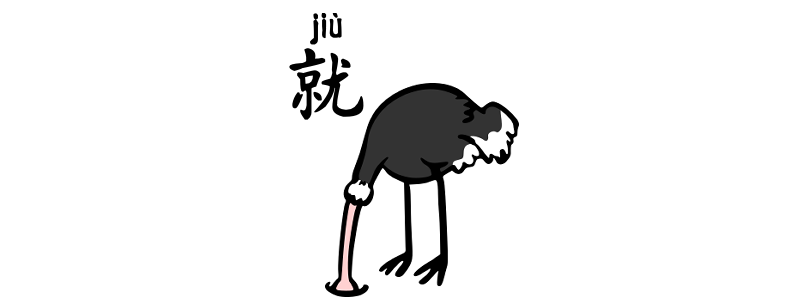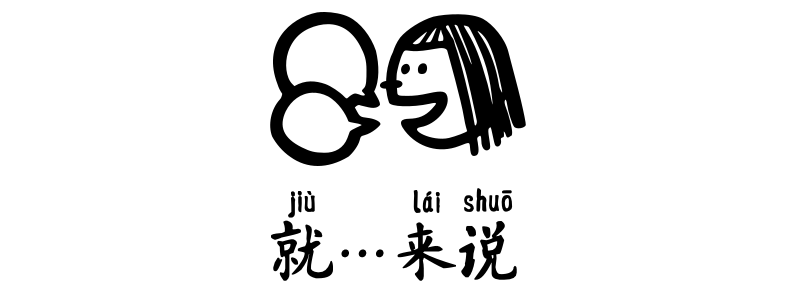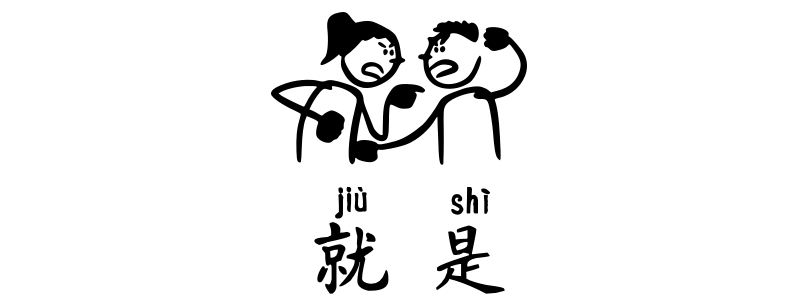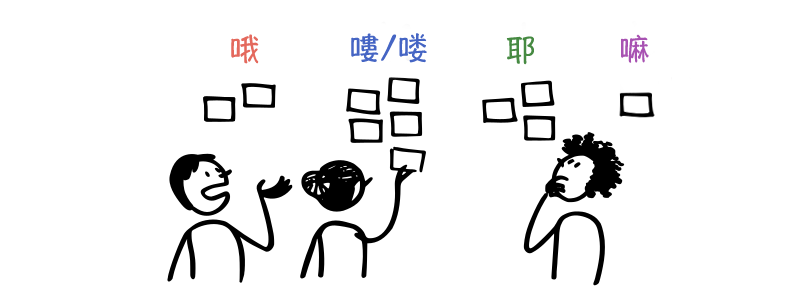Grammar Point:才 cái has the function of indicating an occurrence that happened later or slower than expected. It can also be used to express “as late as” or “not until” in English. Structure S + Time word + 才 cái + V 不好意思bùhǎoyìsi, 你們nǐmen先xiān吃chī吧ba! 我wǒ大概dàgài八bā點diǎn才cái會huì到dào不好意思bùhǎoyìsi, 你们nǐmen先xiān吃chī吧ba! 我wǒ大概dàgài八bā点diǎn才cái会huì到dàoSorry, you go ahead and eat first! I probably…
Author: tiffany
就 jiù – Giving an exception
Grammar Point:In this usage, 就 jiù emphasizes the exception or the unusualness of the situation. It is often used to express surprise or to draw attention to the exception. Structure The exception + 就 A: 為什麼wèishénme外國人wàiguórén都dōu不bù敢gǎn吃chī臭豆腐chòudòufǔ? A: 为什么wèishénme外国人wàiguórén都dōu不bù敢gǎn吃chī臭豆腐chòudòufu? Why do foreigners dare not eat stinky tofu? B: 我wǒ就jiù敢gǎn吃chī啊aB: 我wǒ就jiù敢gǎn吃chī啊aAs for me, I dare to eat…
就 jiù – With regard to
Grammar Point:The word 就 jiù has several meanings in Chinese, and one of its uses is to indicate “with regard to” or “in terms of”. In this sense, it is often used to introduce a topic or a specific aspect of something that is being discussed. Structure S + 就 + Topic + VO It…
Easier 就 jiù Grammar
Grammar Point:In Chinese, 就 jiù can be used to express that something happens easier than expected. It is often used in a positive way to indicate a pleasant surprise or an unexpected result. Structure S + 就 jiù + Unexpected result It is often combined with 没想到 méixiǎngdào or 想不到 xiǎngbùdào to express the speaker’s…
Only 就 jiù Grammar
Grammar Point:In Chinese grammar, 就 jiù can be used as an adverb to indicate “only” or “just” in a sentence. This usage of 就 jiù can be called “small quantity” because it is used to emphasize a small quantity or a small degree of something. Structure S + 就 jiù + V + O 我wǒ就jiù喝hē了le一yì杯bēi水shuǐ我wǒ就jiù喝hē了le一yì杯bēi水shuǐI…
Condition only if 才 cái Grammar
Grammar Point:In Chinese grammar, 才 cái is used to express the meaning of “only if” or “only when.” When used with 如果 rúguǒ, it implies that a certain condition must be met before the result or consequence in the main clause can happen. However, meeting the certain condition doesn’t guarantee that the result or consequence…
Condition if 就 jiù Grammar
Grammar Point:When 就 jiù is used with 如果 rúguǒ, it usually implies that if the condition in the “if” clause is met or becomes true, then the result or consequence in the main clause will also happen. It can be translated as “in the case that” or “if…then…” in English Structure 如果 rúguǒ ··· +…
Earliness 就 jiù Grammar
Grammar Point:就 jiù has the function of indicating an occurrence that happened earlier or sooner than expected. It can also be used to express that something is going to happen in the very near future. Structure S + Time word + 就 jiù + V Function 1 – It indicates that something is going to…
Exactly 就是 jiùshì Grammar
Grammar Point:As an adverb, 就 jiù can be placed before the predicate to add emphasis. “就是 jiùshì” is used to emphasize or confirm a statement. It can be translated into English as “exactly,” “indeed,” or “only because.” Structure 就是 jiùshì + N/SV A: 喂wéi? 請qǐng找zhǎoTiffany A: 喂wéi? 请qǐng找zhǎoTiffany Hello? May I speak to Tiffany, please?B: 我wǒ就是jiùshìB: 我wǒ就是jiùshìThis…
喔 o 嘍/喽 lou 耶 ye 嘛 ma Practice
TouchHover over the space to see the answers. Linking sounds practice – 喔 / 嘍喽 / 耶 / 嘛 Situation You and your friend are going to attend a friend’s party. You are running out of time, but your friend is still making coffee… 👩🏻 : 快kuài點diǎn( D ) ! 快kuài点diǎn( D ) ! Hurry…




